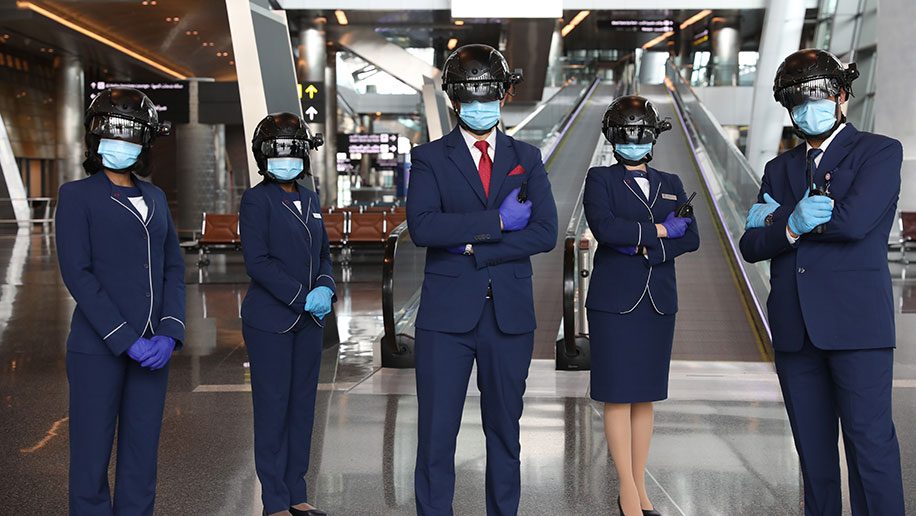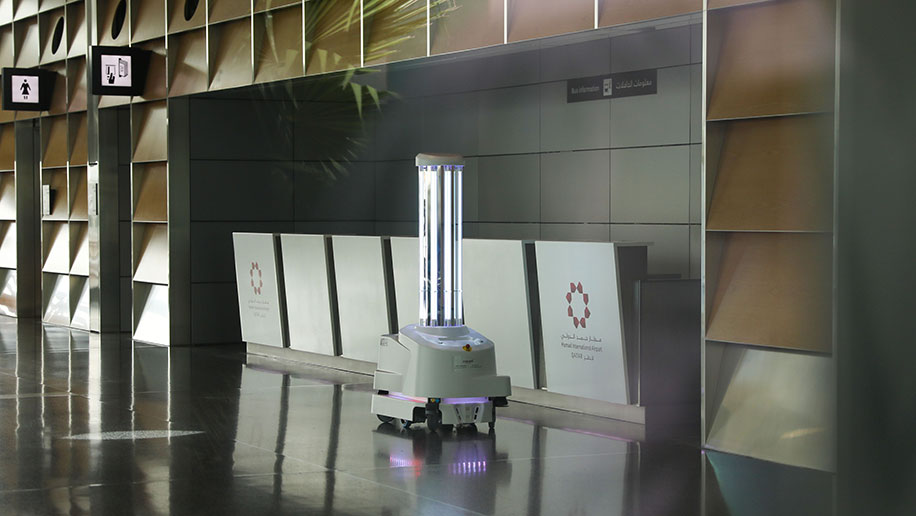With robots roaming the terminal and staff kitted out in Smart Screening Helmets, is Doha’s Hamad International airport a taste of the future? Sam Ballard reports
Doha Hamad International airport (HIA) in Qatar has deployed wearable intelligent technology, robots and temperature screening as part of new coronavirus-fighting measures ahead of greater numbers of arriving international visitors.
The Smart Screening Helmet with built-in augmented reality display allows airport staff to record and analyse people’s temperature through infrared thermal imaging and artificial intelligence. Visitors to the airport will also see fully autonomous robots emitting a concentrated UV-C light to eliminate the majority of infectious microorganisms. The machines will be deployed in “vulnerable high passenger flow areas to reduce the spread of pathogens”.
Visitors to the airport will also see fully autonomous robots emitting a concentrated UV-C light to eliminate the majority of infectious microorganisms. The machines will be deployed in “vulnerable high passenger flow areas to reduce the spread of pathogens”.
Engr Badr Mohammed Al Meer, chief operating officer at Hamad International airport, says: “HIA has adapted to the changes brought on by the spread of Covid-19 on the world, especially on the travel sector.
“Recovery plans have been put in place with priority given to the safety and comfort of travellers and employees. These plans include the use of the latest advanced technology to achieve the highest safety standards for the future travel experience.” The Qatari airport will also be putting in measures to ensure that visitors keep 1.5 metres away at all times through distance seating and floor markings.
The Qatari airport will also be putting in measures to ensure that visitors keep 1.5 metres away at all times through distance seating and floor markings.
In terms of disinfecting, the airport has invested in ultraviolet disinfection tunnels to clean all checked in baggage – departing, arriving and transferring.
Air travel has been one of the industries that has come under the most scrutiny during the coronavirus pandemic. While there will undoubtedly be a slew of changes brought in by governments, airlines and airports many companies were already working on delivering a next generation experience.

One of those which has released some of its ideas is Delta which is working on innovative ideas including Parallel Reality Screens where screens display different information for different people.
The Parallel Reality screens are enabled by a new pixel that, according to creators Misapplied Sciences, has “unprecedented capabilities”.
The pixels are capable of projecting millions of light rays of different colours and brightnesses, and each ray can be software-directed to a specific person.
The company believes it has broad application in numerous industries, from travel and hospitality to marketing, entertainment and traffic signals.
Delta’s chief operating officer Gil West says that the technology “has to be seen to be believed”, adding that “it has the potential to make even the busiest airports much easier to navigate, even if you don’t speak the language”.
“Not only will Parallel Reality reduce stress and save time for our customers, but when combined with the warmth and thoughtfulness of our Delta people, the possibilities are endless,” says West.
Adding: “At Delta, we foster an innovation ecosystem that allows us to think big, start small and scale fast as technology and consumer expectations evolve – whether it’s with our own solutions or in partnership with leading startups like Misapplied Sciences.”
What’s coming next? Trend reports available to download HERE



